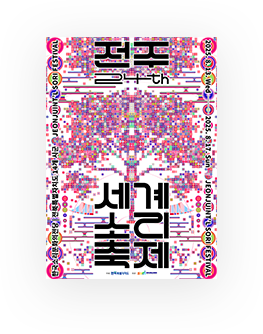d-day
D
+
291


2025. 8. 13. Wed - 2025. 8. 17. Sun

60 Minute
Free
All Ages Admitted
Various Jeonbuk-style Pangut Stages Plus Gangneung Nongak from Yeongdong Province!
Exciteful Pungmul Stages for Five Days of Sori Festival Period
Nongak (lit. farmers’ music) that has been traditionally performed to pray for the harmony, prosperity, and peacefulness of the village community became developed into Korea’s representative performing art genre. Nongak is a synthetic art from in which performers march or act while playing percussive instruments such as kkwaenggwari, jing, janggu, buk, sogo, etc.. The ensemble-format, rhythm, play style, costumes of nongak bands vary from village to village. It was designated as a UNESCO Intangible Cultural Heritage in November 2014.
During the 2024 Jeonju International Sori Festival period, a variety of pangut (lit. field for ritual-like performance) sub-styles from Jeonbuk Province will be performed. The audience will be able to meet Honam-udo nongak (from Iri and Gochang), Jeolla-jwado nongak (from Jinan), Baekjungnori (also known as Jeonju-gijeopnori) plus Gangneung Nongak from Yeongdong Province (i.e., the eastern part of Gangwon-do region). During the five days of Sori Featival, let us experience the excitement and beauty of traditional arts through enjoying this “pungmulgut (lit. percussive music-ritual) fever” performances that symbolize harmony, unity, and enthusiasm.
![]()
Encounter between Traditional Community-based Cultures of Korea and Japan!
“Jeonju Gijeopnori” is a community-based entertainment form performed by villages in mid-July. Each village competes in strength and skill to wash away the fatigue of agricultural labor and to resolve inter-personal and inter-village conflicts. The dynamic and spectacular movements of 6-meter-long dragon-flag is attractive. Audiences can enjoy the excitement and energy of Korean folk culture from watching it.
“Shishimai (Lion Dance)” is a folk dance that has been passed down in various forms throughout Japan. Takebe Shishimai is a preservation society of Shishimai form developed in the Noto region of Ishikawa Prefecture. The society’s members include various type of people, from students to salary workers.
The performance was organized through a friendship-exchange agreement between the Jeonbuk Special Self-Governing Province and Ishikawa Prefecture. Let us look forward to the encounter between these folk cultures of Korea and Japan!